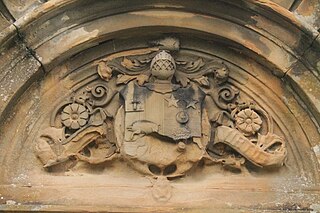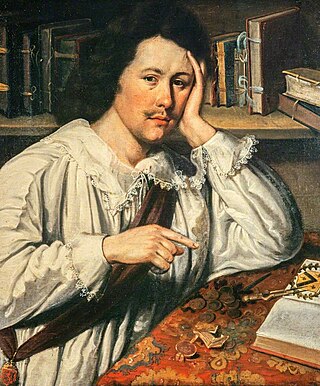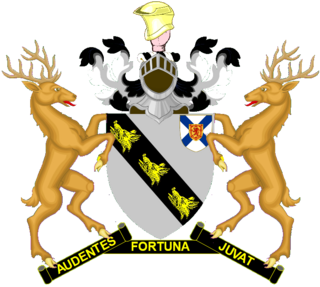Baron Wrottesley, of Wrottesley in the County of Stafford, is a title in the Peerage of the United Kingdom. It was created on 11 July 1838 for Sir John Wrottesley, 9th Baronet. He was a Major-General in the Army and also represented Lichfield, Staffordshire and Staffordshire South in House of Commons. The Wrottesley family's original patronymic was 'de Verdun', which meant that the creation of the title Baron Wrottesley represented the third barony created by a branch of the de Verdun family in England. The other two were established by Theobald de Verdun, 1st Baron Verdun of Alton Castle and Sir John de Verdon, 1st Baron Verdon, lord of Brixworth in Northamptonshire and Bressingham in Norfolk.

The Fergusson Baronetcy, of Kilkerran in the County of Ayr, is a title in the Baronetage of Nova Scotia. It was created on 30 November 1703 for the prominent advocate John Fergusson. The second Baronet represented Sutherland in the House of Commons and served as a Lord of Session under the judicial title Lord Kilkerran. The third Baronet, who with his brothers owned plantations and enslaved people in Jamaica and Tobago, sat as Member of Parliament for Ayrshire and Edinburgh. In 1796 he claimed the earldom of Glencairn. The House of Lords decided that he had successfully proved that he was heir-general to Alexander Cunningham, 10th Earl of Glencairn, but that he had not proved his right to the earldom. The sixth Baronet was a Conservative politician and colonial governor and notably served as Governor of New Zealand from 1873 to 1874 and as Governor of Bombay from 1880 to 1885. The seventh Baronet was Governor-General of New Zealand between 1924 and 1930. The eighth Baronet was an author and historian and also served as Lord-Lieutenant of Ayrshire.

There have been four baronetcies created for persons with the surname Baird, two in the Baronetage of Nova Scotia and two in the Baronetage of the United Kingdom.
There have been five baronetcies created for persons with the surname Hill, one in the Baronetage of Nova Scotia, one in the Baronetage of Great Britain, one in the Baronetage of Ireland and two in the Baronetage of the United Kingdom. Three of the creations are extant as of 2008.

There have been four baronetcies created for persons with the surname Hope, three in the Baronetage of Nova Scotia and one in the Baronetage of the United Kingdom. As of 2010 one creation is extant, one dormant and two extinct.

There have been three baronetcies created for members of Clan Balfour, one in the Baronetage of Nova Scotia and two in the Baronetage of the United Kingdom. One is extant and a subsidiary title of Baron Riverdale.
There have been four baronetcies created for persons with the surname Holland, one in the Baronetage of England and three in the Baronetage of the United Kingdom.
There have been two baronetcies created for persons with the surname Bethune, one in the Baronetage of Nova Scotia and one in the Baronetage of the United Kingdom.

Sir James Cockburn, 9th Baronet, of Langton, Berwickshire was British Governor of Bermuda from 1811 to 1812, from 1814 to 1816 and from 1817 to 1819.

There have been three baronetcies created for persons with the surname Munro, one in the Baronetage of Nova Scotia and two in the Baronetage of the United Kingdom.

The Craufurd Baronetcy, of Kilbirney in south-west Scotland, is a title in the Baronetage of Great Britain. It was created on 8 June 1781 for Alexander Craufurd, the member of an ancient Scottish family. The General and Major-General were elected to the Nottinghamshire East Retford of the almost wholly unreformed (pre-1832) House of Commons.

The Turing Baronetcy, of Foveran in the County of Aberdeen, is a title in the Baronetage of Nova Scotia. It was created in 1638 for John Turing, who was granted the barony of Foveran in Aberdeenshire by the king. He was a supporter of Charles I and was taken prisoner by the Covenanters in 1639. In 1651, he fought at the Battle of Worcester. The Turing family descends from Sir William Turing, a supporter of David II (1329–1371).
The Malcolm Baronetcy, of Balbedie and Innertiel in the County of Fife, is a title in the Baronetage of Nova Scotia. It was created on 25 July 1666 for John Malcolm, subsequently Member of Parliament for Kinross-shire. He was the son of John Malcolm (1611–1692), of Balbedie, Lochore and Innertiel, a Member of the Scottish Parliament.
There have been three baronetcies created for persons with the surname Foulis, one in the Baronetage of England and two in the Baronetage of Nova Scotia.

There have been five baronetcies created for persons with the surname Kennedy, one in the Baronetage of Ireland, three in the Baronetage of Nova Scotia and one in the Baronetage of the United Kingdom. One creation is extant as of 2010.
Major Sir Keith Alexander Fraser, 5th Baronet (1867–1935) was a British cavalry officer, and a Conservative Member of Parliament for Harborough from 1918 until 1923.
Before the Acts of Union 1707, the barons of the shire of Inverness elected commissioners to represent them in the unicameral Parliament of Scotland and in the Convention of the Estates.
The Wedderburn baronetcy of Blackness in County Forfar was created in the Baronetage of Nova Scotia in 1704, for John Wedderburn. He was an advocate and Clerk of Bills. On 9 August 1704 he was created a baronet, of Balindean in the County of Perth, in the Baronetage of Nova Scotia, with special remainder to his heirs male whatsoever. On the death of the third Baronet in 1723 the title was inherited by Alexander Wedderburn, the nephew of the first Baronet.

The Fraser Baronetcy, of Ledeclune in the County of Inverness, was created in the Baronetage of the United Kingdom on 27 November 1806 for William Fraser. The third Baronet served with the 7th Hussars in Spain during the Peninsular War, and was on the staff of the Duke of Wellington during the Waterloo Campaign. The fourth Baronet was an author and collector and also represented Barnstaple, Ludlow and Kidderminster in the House of Commons. The fifth Baronet sat as Member of Parliament for Harborough.